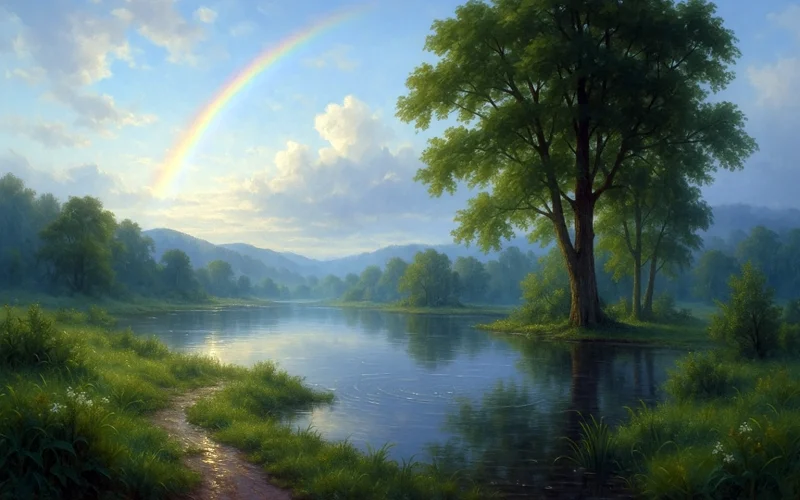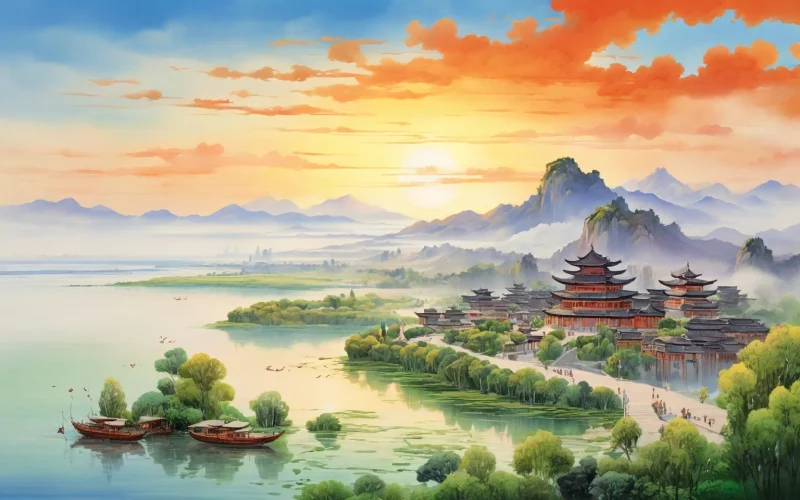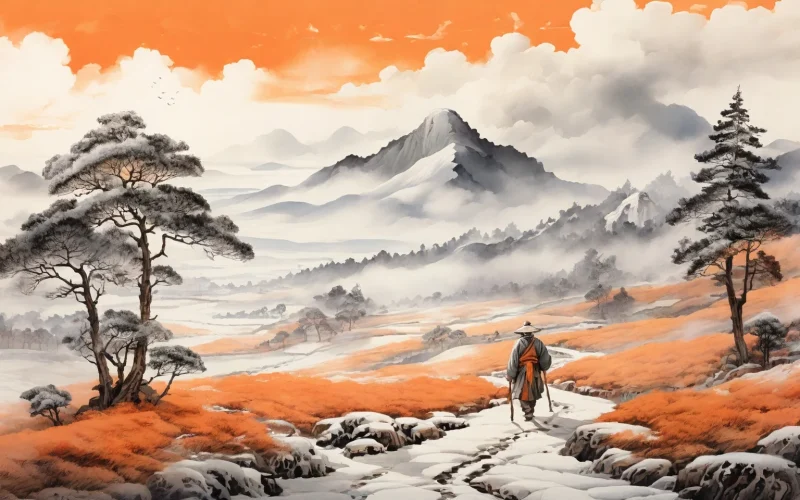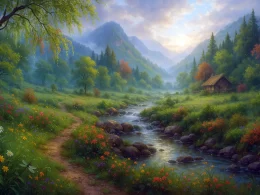I had so long been troubled by official hat and robe
That I am glad to be an exile here in this wild southland.
I am a neighbour now of planters and reapers.
I am a guest of the mountains and woods.
I plough in the morning, turning dewy grasses,
And at evening tie my fisher-boat, breaking the quiet stream.
Back and forth I go, scarcely meeting anyone,
And sing a long poem and gaze at the blue sky.
Original Poem
「雨后晓行独至愚溪北池」
柳宗元
宿云散洲渚,晓日明村坞。
高树临清池,风惊夜来雨。
予心适无事,偶此成宾主。
Interpretation
This poem was written by Liu Zongyuan during his exile in Yongzhou, depicting the morning scenery of Fool's Pond after rain. Through natural imagery, the poet expresses his longing for a simple, tranquil life while subtly revealing his pursuit of inner peace amidst adversity.
First Couplet: "宿云散洲渚,晓日明村坞。"
Sù yún sàn zhōu zhǔ, xiǎo rì míng cūn wù.
Night clouds linger over islets and shores; morning sun brightens village huts.
The opening paints Fool's Pond at dawn after rain - dispersing clouds, emerging sunlight. The broad, cheerful scene creates a refreshingly serene atmosphere that lifts the spirit.
Second Couplet: "高树临清池,风惊夜来雨。"
Gāo shù lín qīng chí, fēng jīng yè lái yǔ.
Tall trees stand by clear pond; wind startles last night's raindrops.
Vivid imagery shines in "wind startles raindrops" - as if breezes frighten droplets clinging to leaves into falling. This dynamic stillness brims with life, subtly mirroring how the poet retains vitality and hope despite life's storms.
Third Couplet: "予心适无事,偶此成宾主。"
Yǔ xīn shì wú shì, ǒu cǐ chéng bīn zhǔ.
My mind happens carefree; by chance we host each other, scene and I.
The conclusion merges poet with landscape through the "host-guest" metaphor, showing harmonious unity. Yet words like "happens" and "by chance" reveal this serenity is fleeting, conveying rare tranquility and cherished beauty.
Holistic Appreciation
The poem unfolds like a morning-after-rain landscape painting: lingering clouds, new sunlight, tall trees by clear water, dripping raindrops - stillness containing movement, movement brimming with feeling. Liu Zongyuan masterfully captures nature's essence in sparse language, infusing scenery with soul. Beyond imagery, the poem conveys quiet solitude - worldly detachment with underlying passion. This "Fool's Pond Morning Scene" reflects the poet's wisdom in finding peace during exile.
Artistic Merits
- Dynamic stillness: "Lingering clouds" and "morning sun" depict quiet scenes, while "startled raindrops" create motion - each enhancing the other.
- Precise diction: The word "startle" personifies wind-drop interaction, energizing the scene.
- Scene-emotion fusion: Landscape mirrors inner world, culminating in subtle emotional resonance that avoids cliché.
Insights
More than depicting nature's beauty after rain, this poem advocates finding stillness in turmoil and clarity in chaos. Though exiled, the poet draws solace from nature's companionship, achieving temporary peace. This wisdom of self-composure in hardship, this capacity to commune with nature as kindred spirit, offers profound inspiration for navigating life's pressures and distractions.
Poem translator
Xu Yuanchong (许渊冲)
About the poet

Liu Zongyuan (柳宗元), 773-819 A.D., a native of Yongji, Shanxi, was a progressive thinker, brilliant writer, and revolutionary statesman of the Tang Dynasty. Nineteen years before he was born, the An Shi Rebellion broke out, which dramatically changed the Tang Dynasty from prosperity to decline. The subsequent failure of the Yongzhen Reform was a historical tragedy that cut short Liu Zongyuan's political future, but made him one of the leading thinkers and literary figures of the Tang Dynasty.











